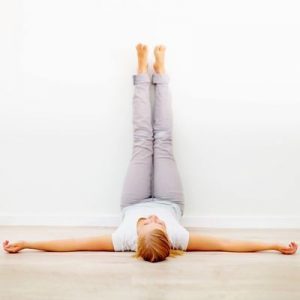Yoga Practice Improves the Symptoms of Restless Legs Syndrome
By John M. de Castro, Ph.D.
“regular yoga poses and stretches can help ease those restless legs syndrome symptoms and help you sleep better, feel less stressed, and even lower blood pressure.” – Everyday Health
Restless legs syndrome, also known as Willis-Ekbom disease, is characterized by an urge to move the legs after rest. This occurs particularly at night but also after extended sitting such as in a car, airplane, or movie theatre. It produces unpleasant sensations in the legs or feet including crawling, creeping, pulling, throbbing, aching, itching, and electric sensations. It can involve twitching and kicking, possibly throughout the night, while you sleep. It is estimated that about 7% of the population experiences restless legs syndrome.
There is no known cause or cures for restless leg syndrome. The only treatments that seem to help are movements such as stretching, jiggling the legs, walking, or pacing. Yoga is a mindfulness practice and an exercise that involves stretching and movement. Hence, it would make sense to explore the ability of yoga practice to improve the symptoms of restless leg syndrome.
In today’s Research News article “Effects of a 12-week yoga versus a 12-week educational film intervention on symptoms of restless legs syndrome and related outcomes: an exploratory randomized controlled trial.” (See summary below or view the full text of the study at: https://www.ncbi.nlm.nih.gov/pmc/articles/PMC7053002/ ) Innes and colleagues recruited adult patients with restless legs syndrome and randomly assigned them to receive a 12-week program of either yoga training or to watch educational films on restless legs syndrome. Yoga training occurred for 75 minutes, 2 times per week for 4 weeks and then once a week for four more weeks. Participants were asked to practice at home for 30 minutes daily. The education class met once a week. The participants were measured before and after training for frequency, intensity, and impact of restless legs syndrome symptoms, sleep quality, health-related quality of life, mood, perceived stress, blood pressure, heart rate, social support, and physical activity.
They found that both the yoga and education groups had significant improvements in restless legs syndrome symptoms, and most secondary outcomes. The yoga group, however, had significantly greater reductions in restless legs syndrome symptoms, perceived stress, sleep quality, and mood. Additionally, the more yoga sessions attended and the greater the amount of home practice the greater the improvement in restless legs syndrome symptoms. This was not true for the education group.
The results suggest that yoga practice produced symptom relief for restless legs syndrome patients to a significantly greater extent than education about restless legs syndrome. Yoga provides exercise and stretching and it is not clear whether the benefits for restless legs syndrome are a result of the exercise or are specific to yoga practice. Future research should compare the effective of yoga practice relative to other exercises for restless legs syndrome. Regardless, it is clear from this study that practicing yoga is a safe, effective, and relatively inexpensive treatment for restless legs syndrome. It should be routinely recommended to relieve the suffering of these patients.
So, yoga practice improves the symptoms of restless legs syndrome.
“When restless legs syndrome keeps you up all night, yoga is a treatment option that helps both your mind and body relax.” – Diana Rodriguez
CMCS – Center for Mindfulness and Contemplative Studies
This and other Contemplative Studies posts are also available on Google+ https://plus.google.com/106784388191201299496/posts and on Twitter @MindfulResearch
Study Summary
Innes, K. E., Selfe, T. K., Montgomery, C., Hollingshead, N., Huysmans, Z., Srinivasan, R., Wen, S., Hausmann, M. J., Sherman, K., & Klatt, M. (2020). Effects of a 12-week yoga versus a 12-week educational film intervention on symptoms of restless legs syndrome and related outcomes: an exploratory randomized controlled trial. Journal of clinical sleep medicine : JCSM : official publication of the American Academy of Sleep Medicine, 16(1), 107–119. https://doi.org/10.5664/jcsm.8134
Abstract
Study Objectives:
To assess the effects of a yoga versus educational film (EF) program on restless legs syndrome (RLS) symptoms and related outcomes in adults with RLS.
Methods:
Forty-one community-dwelling, ambulatory nonpregnant adults with moderate to severe RLS were randomized to a 12-week yoga (n = 19) or EF program (n = 22). In addition to attending classes, all participants completed practice/treatment logs. Yoga group participants were asked to practice at home 30 minutes per day on nonclass days; EF participants were instructed to record any RLS treatments used on their daily logs. Core outcomes assessed pretreatment and posttreatment were RLS symptoms and symptom severity (International RLS Study Group Scale (IRLS) and RLS ordinal scale), sleep quality, mood, perceived stress, and quality of life (QOL).
Results:
Thirty adults (13 yoga, 17 EF), aged 24 to 73 (mean = 50.4 ± 2.4 years), completed the 12-week study (78% female, 80.5% white). Post-intervention, both groups showed significant improvement in RLS symptoms and severity, perceived stress, mood, and QOL-mental health (P ≤ .04). Relative to the EF group, yoga participants demonstrated significantly greater reductions in RLS symptoms and symptom severity (P ≤ .01), and greater improvements in perceived stress and mood (P ≤ .04), as well as sleep quality (P = .09); RLS symptoms decreased to minimal/mild in 77% of yoga group participants, with none scoring in the severe range by week 12, versus 24% and 12%, respectively, in EF participants. In the yoga group, IRLS and RLS severity scores declined with increasing minutes of homework practice (r = .7, P = .009 and r = .6, P = .03, respectively), suggesting a possible dose-response relationship.
Conclusions:
Findings of this exploratory RCT suggest that yoga may be effective in reducing RLS symptoms and symptom severity, decreasing perceived stress, and improving mood and sleep in adults with RLS.
https://www.ncbi.nlm.nih.gov/pmc/articles/PMC7053002/
